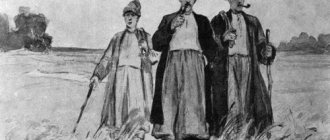I
Tunbridge, 15 July 1739
My dear boy,
Thank you for being concerned about my health; I would have made myself known long ago, but here on the waters I don’t really want to write letters. I feel better since I've been here and that's why I'm staying another month.
Signor Zamboni lavishes more praise on me through you than I am worth. And you try to deserve everything that he says about you; remember that any praise, if it is not deserved, becomes a cruel mockery and even more than that - an insult and most clearly exposes human vices and follies. This is a rhetorical figure whose name is irony: a person says the exact opposite of what he thinks. And at the same time, this is not a lie, for he makes it clear that he does not think at all what he says, but quite the opposite. For example, if someone praises a notorious swindler for his decency and incorruptible honesty, and a complete fool for his abilities and wit, the irony is completely obvious and everyone will easily understand that this is nothing more than ridicule. Imagine that I would begin to praise you for the fact that you study your book very carefully, and for the fact that you have learned and still remember everything that you once taught, would you really not immediately notice my irony, would you not feel Why am I laughing at you? Therefore, when they begin to praise you for something, think carefully and decide whether you deserve this praise or not; and if not, then know that they are only mocking and laughing at you; try in the future to be worthy of the best and make sure that any irony towards you is inappropriate.
Give my regards to Mr. Metter and thank him for his letter. He writes that you have to take up Latin and Greek grammar again; I hope that by my return you will have thoroughly studied them; but even if you fail to do this, I will still praise you for your diligence and memory. Goodbye.
about the author
Philip Dormer Stanhope, 4th Earl of Chesterfield September 22, 1694, London - March 24, 1773, there English statesman, diplomat and writer, author of Letters to his Son.
Before his father's death in 1726 he was known as Lord Stanhope. A distant relative and direct heir to the title of the influential politician James Stanhope, 1st Earl of Chesterfield (1673-1721), Philip Stanhope was raised by a French tutor, studied at Trinity College, Cambridge University (1712-1714) and completed the obligatory for a wealthy gentleman of those years travel (grand tour) across the continent. It was interrupted by the death of Queen Anne. James Stanhope summoned Philip to his homeland and installed him in the place of Lord of the Bedchamber of the Prince of Wales; in 1715 Philip joined the House of Commons from the Cornish village of St. Germain (see rotten towns). His first speech in parliament resulted in a fine of 500 pounds for him, since Philip was six weeks short of coming of age. In 1716, during the conflict between King George I and his son, the future George II, Stanhope joined the camp of the Prince of Wales and his mistress Henrietta Howard, which brought him political benefits with the accession of George II to the throne and the hatred of the Princess of Wales. With the death of his father in 1726, Philip took the title of Earl of Chesterfield and moved from the House of Commons to the House of Lords. Here his oratorical skills, unnecessary in the lower house, were finally appreciated and in 1728 Chesterfield accepted the important post of ambassador to The Hague (and it is likely that he was a kind of honorary exile arranged by Walpole). Chesterfield turned out to be a capable diplomat, he concluded the Treaty of Vienna in 1731 for Great Britain, but due to poor health he returned to his homeland in 1732. The diplomatic service brought him the Order of the Garter and the court title of Lord Steward. Also in 1732, his illegitimate son from Elizabeth du Boucher was born in The Hague, also Philip Stanhope (second, 1732-1768), to whom Chesterfield subsequently dedicated “Letters to his Son.” Returning to the House of Lords, Chesterfield became one of its leaders. Soon, because of the excise law, Chesterfield went into open opposition to Walpole and lost his court titles. The opposition managed to remove Walpole from power only in 1742, but there was no place in the new government for Chesterfield; he ruined relations with both the new temporary workers and George II himself. From 1743 Chesterfield wrote anti-Georgian tracts for the journal Old England under the name Jeffrey Broadbottom. Finally, in 1744, a coalition of Chesterfield, Pitt and Henry Pelham managed to overthrow the Carteret government, and Chesterfield returned to the executive branch. First, he again went as ambassador to The Hague, where he achieved the entry of Holland into the War of the Austrian Succession on the side of the British. This was followed by an extremely successful reign as Lord Lieutenant of Ireland from 1744–1746, considered the pinnacle of Chesterfield's career as an administrator. In 1746 he returned to London to the post of Secretary of State, but in 1748 he resigned from all posts due to permanently damaged relations with the king and queen and refused the “consoling” ducal title. For some time he continued his parliamentary activities, including opposing the Stamp Act and promoting the transition of Great Britain to the Gregorian calendar, which was called the Chesterfield calendar. However, due to his impending deafness, by the end of the 1750s Chesterfield left politics forever. “Letters to a Son” Chesterfield was married for convenience to the illegitimate daughter of George I, Melusine von Schulenburg, but no legitimate children were born in this marriage. Philip Stanhope (the second), his favorite illegitimate son, had all the support of his father (including a seat in the House of Commons), but was never accepted into high society. In addition, already in old age, Chesterfield adopted the third Philip Stanhope (1755-1815), who eventually became the heir to the family wealth. Philip Stanhope (the second), despite his father’s close guardianship, had an “inadmissible” relationship with the Irishwoman Eugenia Dornvil from 1750, from whom two sons were born in 1761 and 1763 - Charles and Philip (the fourth); the parents married only in 1767, and in 1768 36-year-old Philip Stanhope (the second) died in Vaucluse. Chesterfield learned of the existence of his grandchildren only after the death of his son. In his will he left them a small capital and nothing to their mother. It was the lack of money that prompted Eugenia Stanhope to sell letters to publishers that were never intended for publication. The publication caused a shock in English society with its family “frankness”; the collection of letters became popular reading and was reprinted several times, bringing the widow a fortune. Chesterfield's letters contain an extensive set of instructions and recommendations in the spirit of the pedagogical ideas of J. Locke. The narrowly practical focus of the educational program (preparation for a high-society and state career) shocked many of Chesterfield’s contemporaries, but the “Letters” were highly appreciated by Voltaire as an example of epistolary prose of the 18th century and a sincere human document. In addition, after the death of the count, “Maxims” (1777) and “Characters” (1777) were published. Chesterfield is also credited with a number of apocryphal writings, including An Apology for Resignation (1748). TSB, Wikipedia.
II
November 20, 1739
My dear boy,
You are busy with the history of Rome; I hope that you devote enough attention and effort to this subject. The usefulness of history lies chiefly in the examples of virtue and vice of men who lived before us: concerning these we must draw our own conclusions. History awakens in us a love of goodness and pushes us to good deeds; it shows us how at all times great and virtuous people were honored and respected during their lifetime, and also with what glory their posterity crowned them, perpetuating their names and bringing the memory of them to the present day. In the history of Rome we find more examples of nobility and generosity, in other words, greatness of soul, than in the history of any other country. No one was surprised there that consuls and dictators (and as you know, these were their main rulers) left their plow to lead armies against the enemy, and then, having won victory, took up the plow again and lived out their days in modest solitude - solitude more glorious than all the victories that preceded him! Many of the greatest people of antiquity died so poor that they had to be buried at public expense. Living in extreme poverty, Curius, however, refused a large sum of money that the Samnites wanted to give him, answering that the good is not to have money yourself, but only to have power over those who have they are. Here's what Cicero says about it:
“Curio ad focum sedenti magnum auri pondus Samnites cum attulissent, repudiati ab eo sunt. Non enim aurum habere praeclarum sibi videri, sed iis, qui haberent aurum imperare”[1] As for Fabricius, who more than once had the opportunity to command Roman armies and each time invariably defeat enemies, the people who came to him saw him sitting at hearth, eats a lunch of herbs and roots, planted and grown by him in the garden. Seneca writes: “Fabricius ad focum coenat illas ipsas radices, quas, in agro repurgando, triumphalis senex vulsit”[2].
When Scipio won a victory in Spain, among those captured was a young princess of rare beauty, who, as he was informed, was soon to be married to one of her noble compatriots. He ordered that she be looked after and cared for no worse than in her own home, and as soon as he found her lover, he gave the princess to him as his wife, and added the money that her father had sent to ransom his daughter to the dowry. Valery Maxim says about this: “Eximiae formae virginem accersitis parentibus et sponso, inviolataru tradidit, et juvenis, et coelebs, et victor”[3]. This was a remarkable example of restraint, endurance and generosity, which won the hearts of all the inhabitants of Spain, who, as Livy states, said: “Venisse Diis simillimum juvenem, vincentem omnia, turn armis, turn benignitate, ac beneficiis.”[4]
Such are the rewards that invariably crown virtue; These are the characters that you must imitate if you want to be famous and good, and this is the only way to come to happiness. Goodbye.
Reviews of books by the author “Philip Chesterfield”
How, how can a father survive his daughter’s first adult night?! How????
The imagination, naturally, paints a different picture, a picture of one’s own deprivation of innocence. And then the obedient maso-imagination completes the drawing... completes the drawing... completes the drawing. Lord, thank you, Lord, that life goes on, despite any imagination of any fathers! That life goes on, despite any phobias, who suddenly became such serious, unbearably serious fathers!
No, well, who knows - whether this is a general rule, after all. There is also a feedback, in a modern, interactive connection - from son to father (does anyone remember the “daughter to father” configuration?). But for some reason, fathers are not so worried about their son’s first night as an adult. Or am I confusing something? Or did you not finish reading or reach such unrest as described in world literature? There seems to be no particular fear or worry, right? Or am I confusing something again?
What’s the joke about a father’s epistle to his son in some 18th century? In some United England and its younger sister Scotland? Together with Wales and the adjoining North. Ireland? Yes, there seemed to be much more concern there than about the first, even if not wedding, night! There were such pearls there that you could even use a Parker with a gold pen in aphorisms! And what? For example: “Any praise, if it is not deserved, becomes a harsh mockery and even more than that - an insult and most clearly exposes human vices and follies.” Tunbridge, July 15, 1739 Yo! Here, from one date, the milk will curdle from boredom, and not to resolutely and uncompromisingly read 200 sheets of gray, dull paper from the early 90s, Russia state.
Is there a connection between the movie “Gladiator” and “Letters to my Son”? Yes, the very best! Do you want to remain in history for centuries? And act like Scipio Africanus, who conquered Spain, took captive a young princess of rare beauty and not only did not appropriate her for himself, but also gave her to the person for whom she was intended, adding some money to what her father sent! Apparently, this virtue was so rare over 2000 years of Euro-history that it remained in Latin - already a sign of elitism - and in a pathetic manifestation: “Venisse Diis simillimum juvenem...” - “A young man like the gods has arrived...”. Such a squiggle!
Achtung! If, reader, you think that the recipient of this Latin is how old, no, you are mistaken! He is 9 years old, but his father believes that she, Latin, is more than appropriate. But what is characteristic? The fact that the father grows up with his son, not instead of him, but with him. For example, after 7 years he writes: “...parental advice is always viewed as senile grumbling.” Well, thanks for that!
“If you want to rid yourself of worries, do not rid yourself, like many others, of your own thoughts.”
“Cardinal Mazarin, who, in order to rake in more money, was able to do anything, agree with everything and forgive anything. He loved power with the love of a moneylender and sought it because wealth came to him.” Everything is fine, but who today knows, both fathers and children, who Cardinal Mazarin is? AND?
Never mind! Reading, and even more so - wisdom - have always been the lot of the elite, not the one at court and in the ailets, but the people's, class-worker-peasant-clergy. To whom it is given - in one word. Therefore, read, let me give this advice to both fathers and “sons”, read Chesterfield (not to be confused with cigarettes of the same name, but of different origin!), despite the ugly printing of the post-USSR and pre-RF, who knows about the boring dating , when former, 18th century. Read and enjoy. Even if you don’t have a son, but a daughter. Without thinking how everything would be for her on her first night as an adult. Because if you did everything correctly before this notorious night, even if you didn’t write letters like author’s, then the night itself, not without certain problems, will... will... will be, well, you yourself know how it happens!
And then both you and your offspring, in your own time, in your own place, will read this from Chesterfield: “Caesar had all the great vices, and Cato had all the great virtues that people can have.” They will read and experience, although not the same great delight that does not come to daughters, unlike sons, on that very first night, but a delightful sense of belonging. To human wisdom, history and destiny!
III
Monday.
My dear boy,
I am very sorry that I did not receive yesterday from Mr. Metter those messages about you that I was expecting with hope. He spends so much effort on classes with you that he fully deserves that you treat them carefully and diligently. Besides, now they talk about you as a boy who knows much more than everyone else - what a shame it would be to lose your good name and allow your peers, whom you left behind, to get ahead of you. All you lack is attention, you grasp quickly, you have a good memory; but if you fail to pay attention, the hours you spend reading a book will be wasted. Just think what a shame and disgrace it is: to have such opportunities to learn and remain ignorant. An ignorant person is insignificant and worthy of contempt; no one wants to be in his company, one can only say about him that he lives, and nothing more. There is a good French epigram on the death of such an ignorant, insignificant person. Its meaning is that only one thing can be said about this man: he once lived, but now he has died. Here is this epigram, it will not be difficult for you to learn it by heart:
Quotes and aphorisms of Philip Chesterfield
Philip Dormer Stanhope Chesterfield, 1694-1773 English writer and statesman.
Resourcefulness is the hidden refuge of inability.
Few people succeed in business, and only if they do nothing else.
Gratitude is a heavy burden that lies on our imperfect nature.
God knows, we have a hard time in this life, and patience is the only way to live at least as well.
In matters of marriage and religion, I am not an adviser - I don’t want people to suffer because of me, both on earth and in heaven.
Lead a quiet life and you will die with a clear conscience.
Politeness and good manners are absolutely necessary to enhance any other virtues or talents. Without them, no knowledge, no perfection appears in the proper light. Without them, a scientist turns into a pedant, a philosopher into a cynic, a military man into a brute, so that it is unpleasant even to meet with one, and the other, and the third.
In slander, as in theft, the victim is considered to blame.
In the pursuit of praise, the best bait is modesty.
All people judge us by our appearance and manners, and only a few by our spiritual qualities.
Any praise, if it is not deserved, becomes a cruel mockery and even more than that - an insult and most clearly exposes human vices and follies.
Anyone who is in a hurry thereby demonstrates that the task he has taken on is too tough for him.
Children and courtiers make mistakes much less often than parents and monarchs.
Virtue is nothing more than spiritual beauty.
When proving your opinion and refuting others if they are wrong, be restrained in both words and expressions.
If I ever wise up, no one will ever see me laugh.
If someone claims that he drank six or eight bottles of wine in one sitting, then out of sheer mercy I will consider him a liar, otherwise I will have to think that he is a brute.
If you can, be smarter than others, but don't show it.
If you are pleased when people are attentive and sensitive to your mood, tastes and weaknesses, you can be sure that the attentiveness and sensitivity that you show to others in similar cases will also be pleasant to them.
If you have discovered some characteristic trait in a person, under no circumstances trust him with anything that concerns this trait.
If you want to please people, appeal to the feelings, be able to dazzle the eyes, sweeten and soften the ears, and attract the heart. And then let their minds try to do something to harm you.
If you please, please everyone in their own way.
Female beauty and male intelligence are mostly detrimental to their owners...
Women are much more alike than men; they are all, in essence, vain and lustful.
Knowledge gives weight, abilities give shine, but people, for the most part, see better than they measure.
Knowledge is a refuge and shelter, convenient and necessary for us in our old age, and if we do not plant a tree while we are young, then when we are old we will have no shade to hide from the sun.
Interest in the inner essence and contempt for outward appearances - such should be the relationship between a reasonable person and his books.
True wit is a quality so rare that many admire it, most strive for it, everyone fears it, and if they value it, it is only in themselves.
Every lost moment is a lost cause, a lost benefit.
Every person seeks the truth, but only God knows who found it.
Every man is sensitive to a favorable manner of address, a pleasant manner of speaking, and easy courtesy, and all these qualities prepare the way for higher virtues to be favorably received.
Apparent ignorance is often the most necessary part of world knowledge.
Both in friendship and in enmity, set certain boundaries for your gullibility and hostility: let the first not reach the point of becoming dangerous, and the second - irreconcilable.
Just as movement excites the appetite, so labor arouses the thirst for pleasure.
Whatever your opinion about your merits, do not flaunt them in society, do not follow the example of those boastful people who try to turn the conversation in such a way that they have the opportunity to show them off. If these are genuine advantages, people will inevitably learn about them without you, and it will be much more beneficial for you.
When you notice that your opponent is getting excited, put an end to the argument with some joke.
When you are praised, think carefully about whether you deserve praise; if you don’t deserve it, then it means you were ridiculed.
The ultimate goal of eloquence is to persuade people.
He who speaks about his own merits is ridiculous, but he who is not aware of them is stupid.
Wherever we go, our reputation - no matter whether good or bad - will definitely precede us.
Lies and deceit are the refuge of fools and cowards.
A lie is a product of malice, cowardice or vanity.
The best defense against bad manners is good upbringing.
People who are not accustomed to social communication, due to inexperience, give away with their appearance what they do not talk about.
People hate those who make them feel inferior.
Ministers are like the sun. The brighter they are, the more they burn.
A young man should be prudent without trying to appear so; an old man should seem prudent, even if he wasn’t.
Young people are as likely to think themselves wise as drunk people are sober.
A wise man lives by his wits and his wallet.
The thoughts of the best minds always ultimately become the opinion of society.
You must be able to remain silent about everything that matters only to you alone.
There is nothing more reckless in the world than half-anger and half-trust.
Do not trust someone who, having barely had time to get to know you, suddenly, without any apparent reason, flares up with ardent love for you.
Do not trust those who loved you with all their hearts after the first meeting and for no apparent reason. Beware also of all those who are ashamed of the highest virtues, passing them off as their weaknesses.
It is not enough to have merit, you must be able to please people.
The inferiority of our friends gives us considerable pleasure.
Never prove your opinion loudly and passionately, even if in your soul you are convinced that you are right - express it modestly and calmly, for this is the only way to convince.
Treating others the way you would like to be treated is the surest way to please people.
Everyone suffers from the transfer except the bishop.
The first sign of a high mind is condescension.
True friendship matures slowly and blossoms only where people have actually proven it to each other.
Take care of the penny, and the pound will take care of itself.
Politicians have neither love nor hate. They are guided not by feelings, but by interest.
Reproach and slander never take up arms against infallibility; slander exaggerates, but does not arise out of nowhere.
Borrowed vices are the most unpleasant of all and the most unforgivable.
Idleness is one of the ways to commit suicide.
Idleness is the lot of weak minds.
Prejudice is our mistress; Reason, at best, is a wife: we often hear its voice, but rarely listen to it.
Make your way to a person's mind through his heart.
Let the sages say whatever they want, but you can get rid of one extreme only by falling into the other.
Enjoy life, enjoy every minute of it - after all, pleasures end before life.
The wound heals faster than the insult.
Women themselves are not made to care; their purpose is to take on our worries.
The stupidest person in the world experiences the same feelings as the smartest.
Restraint is an extremely unpleasant trait, while lack of restraint is extremely dangerous.
Modesty is the surest way to satisfy our vanity.
Hiding the truth where it is necessary is both prudent and blameless, while lying, in any case, is both low and stupid.
Advice is rarely accepted with gratitude; those who need them most use them least.
Consciousness of one's dignity makes an intelligent person more modest, but at the same time more persistent.
Writers of aphorisms, for the most part, place beauty of thought above accuracy and justice.
Be suspicious of those who loudly extol some virtue...
Diligently avoid any friendship with fools and rogues, if the word “friendship” is even applicable in relations with such people.
With those who are silent, they are silent; with the one who tells everything, they are also silent.
Style is the clothing of thought.
Those who demand freedom loudest are the ones who endure it the worst.
Patience is absolutely necessary for a business person, because for many it is much more important not to conclude a deal with you, but to have a heart-to-heart talk.
What you like in others, others will like in you.
It’s hard to even imagine how many different ways vanity has to deviate from its goal.
It is difficult to say who is more stupid - the one who tells the whole truth to the end, or the one from whom you never hear the truth at all.
Vanity disgusts everyone for the simple reason that it is common to everyone without exception, and two vanities will never come together.
Each person has his own aspirations, his own ambition; the only difference is that among stupid people, ambition is also stupid and directed in the wrong direction, but among intelligent people, ambition is legitimate and worthy of all praise.
A smart person is sometimes in a hurry, but does not do anything in a hurry.
Learn to lower yourself to the level of those among whom you find yourself.
Physical ailments are the tax that our damned life takes from us; Some are taxed higher, others lower, but everyone pays.
Cunning is the secret refuge of mediocrity.
Keep your knowledge, like a watch, in your inner pocket; do not display them, as a watch does, without any reason, just to show that you have them.
It is often more necessary to hide contempt than anger: insults may still be forgotten, but contempt is never forgiven.
Frequent and loud laughter is a sign of stupidity and bad upbringing.
A well-mannered person knows how to speak with inferior people without arrogance, and with superiors - with respect and ease.
The ambition of a man of intelligence and integrity is to stand out among others by his good name and to be valued for his knowledge, truthfulness and nobility - qualities that cannot be bought anywhere, but can only be acquired by those who have a clear head and a kind heart .
To win a woman's affections, the same flattery is required; To please a man, it’s different every time.
To control humanity, one must not overestimate it, just as a speaker, if he wants to be loved by the public, must despise it.
More on the topic:
- Quotes from English writers
- Aphorisms, sayings and quotes by Richard Steele
- Quotes and aphorisms by George Halifax
Popular:
- Culture and art
- Liberty
- Proverbs about intelligence and stupidity
Comments:









